
Grenadiers or rattails are generally large, brown to black gadiform marine fish of the subfamily Macrourinae, the largest subfamily of the family Macrouridae. Found at great depths from the Arctic to Antarctic, members of this subfamily are amongst the most abundant of the deep-sea fish.
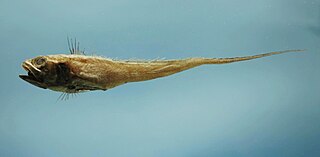
Macrouridae is a family of deep sea fish, a diverse and ecologically important group, which are part of the order of cod-like fish, the Gadiformes. The species in the Macrouridae are characterised by their large heads which normally have a single barbel on the chin, projecting snouts, and slender bodies that taper to whip-like tails, without an obvious caudal fin but what there is of the caudal fin is often confluent with the posterior dorsal and anal fins. There are normally two dorsal fins, the anterior dorsal fin is quite high, the posterior quite low but is longer and takes up a greater proportion of the fish's back. Species in the subfamily Macrouroidinae have a single dorsal fin. The long anal fin is almost as long as the posterior dorsal fin, and sometimes it is longer. The pelvic fin is inserted in the vicinity of the thorax and normally has 5–17 fin rays but these are absent in Macrouroides. The body is covered in small scales and if they have a photophore, it is usually on the midline of the abdomen just in front of the anus. The bioluminescence of these fish is produced by symbiotic bioluminescent bacteria. The structure of the skull has been used to show their placing in the Gadiformes, but they differ from the typical cods in that they possess one stout spine in the anterior dorsal fin.
The slender unicorn rattail is a rattail of the genus Trachyrincus, found in south-east Australia and New Zealand, at depths of between 850 and 1,300 m. Its length is between 30 and 60 cm.

Coelorinchus is a genus of rattail fish.

Coryphaenoides is a genus of rattails which is found in all oceans of the world. They are found in deep waters and C. yaquinae, recorded to 7,012 m (23,005 ft), is the only member in the family known from the hadal zone.

Gadomus is a genus of rattails in the family Bathygadidae.
Bathygadus is a genus of rattails of the family Bathygadidae.
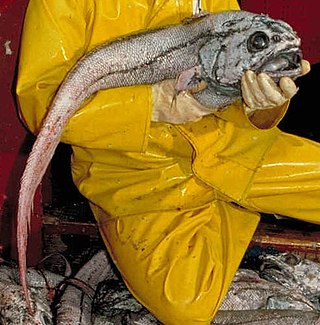
Albatrossia pectoralis, the giant grenadier or giant rattail, is a very large rattail, and the only member of the genus Albatrossia. It is found in the north Pacific from northern Japan to the Okhotsk and Bering Seas, east to the Gulf of Alaska, and south to northern Baja California in Mexico. It is found at depths between 140 and at least 4,250 m, but typically between 700 and 1100 m. The giant grenadier has the usual greatly elongated, pointed tail of the rattails.

Lucigadus is a genus of rattails.

Macrourus is a small benthopelagic genus of rattails from the family Macrouridae.
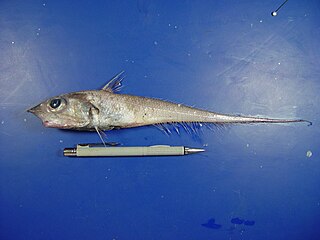
Nezumia is a genus of rattails. The generic name derives from the Japanese 鼠 (nezumi), meaning "mouse".

Hymenocephalus is a genus of rattails.
Pseudocetonurus septifer is a species of rattail, the only known species in the genus Pseudocetonurus. This fish is found at depths of up to 950 m in the waters around Hawaii and in the south-eastern Pacific. It has recently also been recorded on the other side of the Pacific, near Taiwan, and this species probably has a pan-Pacific distribution but has been underrecorded due to the depths in which it lives.
The plainfin grenadier is a species of rattail. This is a deep-water fish found at depths of up to 772 m. It has a wide distribution in the Indian and western Pacific Oceans.
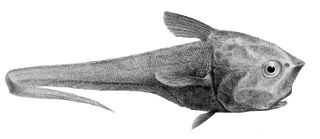
Cetonurus is a genus of rattails.
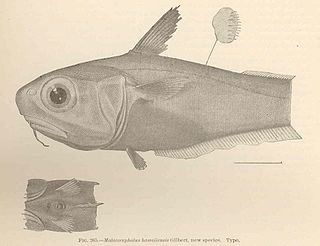
Malacocephalus is a genus of rattails.

Trachonurus is a genus of rattails.
Hymenogadus is a genus of rattails, marine fish.

Trachyrincus scabrus, the roughsnout grenadier or Mediterranean longsnout grenadier, is a species of bathydemersal marine fish from the subfamily Trachyrincinae, part of the family Macrouridae. It is found in the eastern Atlantic Ocean and the Mediterranean.
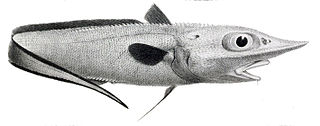
The roughnose grenadier is a species of fish in the subfamily Macrourinae (rat-tails). The species is named for Sir John Murray.















